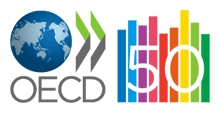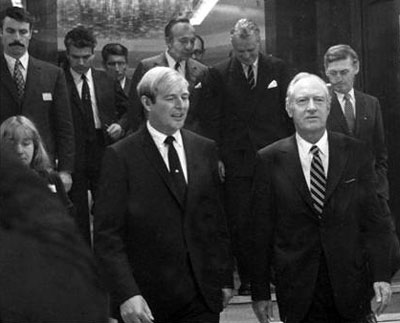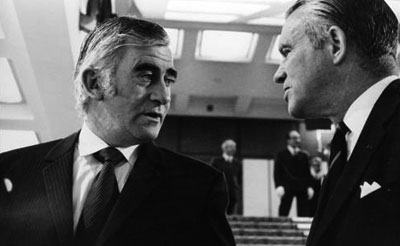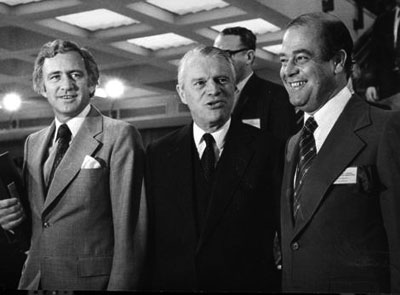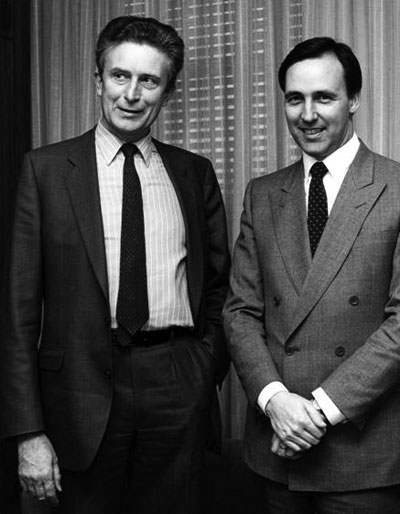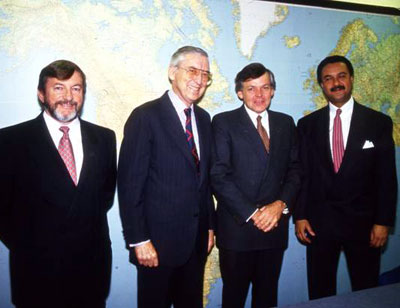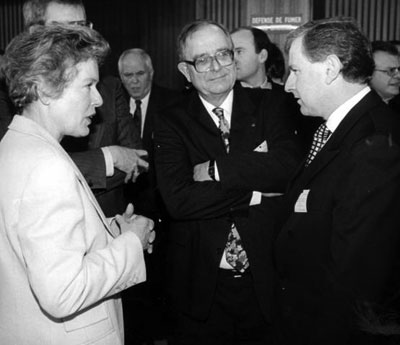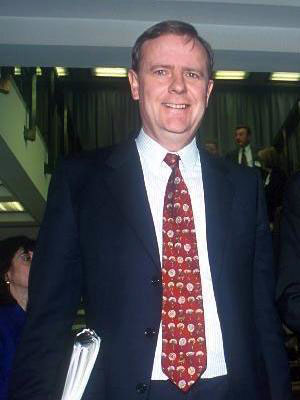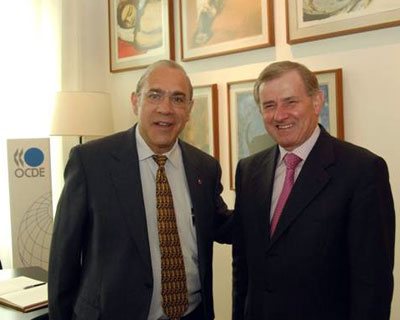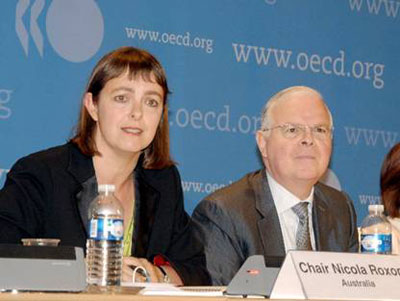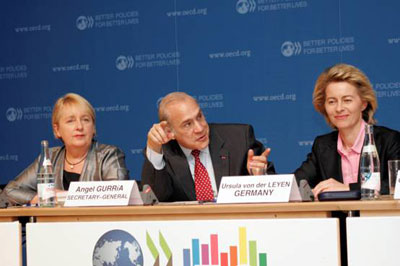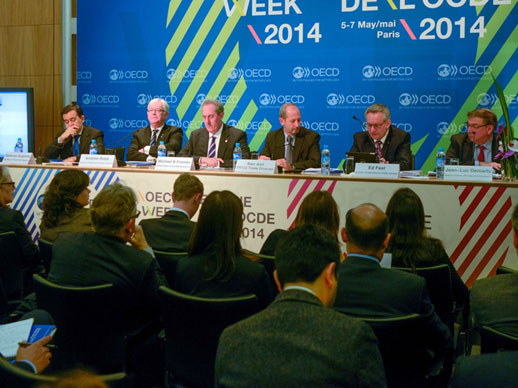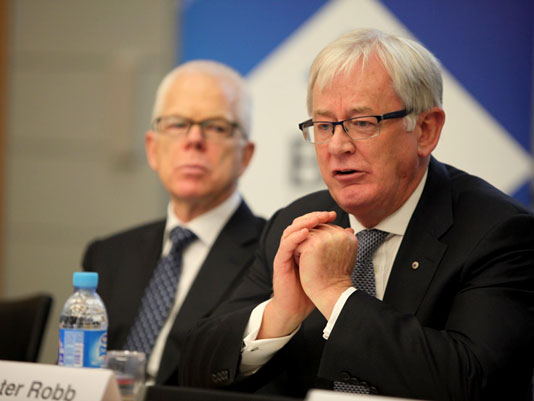This OECD 50th Anniversary Prezi presentation is approximately 19 MB and may take a long time to load on slower Internet connections. An alternative text and image version is available below. The alternative version also includes key events that took place after 2011.
OECD: A 50 year journey…
The Beginning – 1947
The Organisation for European Economic Cooperation (OEEC) was established to run the US-financed Marshall Plan for reconstruction of Europe after the ravages of World War II.
The OEEC Charter, signed in 1948, established the OECD. Photo courtesy of the OECD.
1961
Encouraged by the original Charter's success and the prospect of carrying its work forward on a global stage, the Organisation for Economic Co-operation and Development (OECD) was officially born on 30 September 1961.
Twenty countries signed the Convention on the Organisation for Economic Co-operation and Development, at Salon de l'Horloge, Quai d'Orsay, Paris, on 14 December 1960. The convention entered force in September 1961 – the birth of the OECD. Photo courtesy of the OECD.
1966
Australia joins the OECD Development Assistance Committee (DAC). Comprising the world's main donors, the DAC seeks to promote poverty reduction and a future in which no country will depend on aid.
1969
Australia's Ted Whitelaw, a senior Treasury official, set Australia on the path to OECD membership commenting that Australia needed "to hear and be heard" in international economic debate. Today, Australia – through both public and private institutions – continues to contribute significantly to the work of the OECD.
John Douglas Anthony (left), Deputy Prime Minister, Minister for Trade and Industry and William P. Rogers, Secretary of State, USA, Chair of the Ministerial Council, in Paris. Photo courtesy of the OECD.
1971
Australia joins the OECD.
1972
Australia's Treasurer B.M. Sneddon and Emile van Lennep, OECD Secretary General, at Australia's second Ministerial Council Meeting in 1972. Photo courtesy of the OECD.
The OECD enacted the Polluter Pays Principle in 1972. In environmental law, the 'polluter pays principle' means the party responsible for producing pollution must also compensate for the damage done to the natural environment. This concept is mentioned in Principle 16 of the Rio Declaration on Environment and Development.
1977
The 1977 OECD Ministerial Council Meeting was chaired by Australia.
(From left): Andrew Peacock, Minister for Foreign Affairs, and Phillip Lynch, Treasurer, with Emile van Lennep, OECD Secretary-General. Photo courtesy of the OECD.
1982
Trade and Agriculture.
One of Australia's main contributions to the OECD's work on agriculture was the concept of the producer support estimate, or "PSE". This concept, which was introduced in 1982, improved the way the OECD measures countries' trade-distorting support for their agricultural producers.
A level-playing field in global agricultural trade is an OECD priority.
1985
OECD Secretary General Jean-Claude Paye (left) during his official visit to Australia with Paul Keating, Australian Treasurer in 1985. Photo courtesy of the OECD.
1987
From the start, Australian thinking has influenced the structural policy work of the OECD. Its first major report in 1987, "Structural Policy and Economic Growth", largely reflected Australian views.
1989
Founding the FATF.
Australia was a founding member of the Financial Action Task Force (FATF), an inter-governmental body whose purpose is the development and promotion of policies to combat money laundering and terrorist financing.
Australia has taken an active part in FATF's policy formulation. Australia also played a supportive role in the creation of one of the FATF-style regional bodies, the Asia-Pacific Group on Money Laundering (APG). The Secretariat of this regional body is located in Australia.
1992
In 1992, Australia played a leading role in the development of the "Canberra Manual", designed to measure the resources devoted to scientific and technological activities.
Also in 1992, Australia's interest in issues surrounding small and medium-size enterprises (SMEs) led to a proposal to form the OECD Working Party on SMEs. The Working Party officially came into existence in 1993, and in 2002, it was renamed the 'Working Party on SMEs and Entrepreneurship'.
This body guides the development of policy through its "Bologna Process".
1993
The annual Ministerial Council of the OECD met on 2 and 3 June 1993. The meeting was chaired by John Dawkins, Treasurer of Australia. At the meeting, members invited the Organisation to deepen work with Mexico and Korea with a view to early membership.
(left to right) – Peter Cook, Australian Trade Minister, Lloyd Bentson, US Secretary of the Treasury, John S. Dawkins, Australian Treasurer, Ronald Brown, US Secretary of Commerce. Photo courtesy of the OECD.
1994
Australia has always taken a strong interest in urban economic, social and environmental problems.
In 1994, Melbourne hosted the OECD-Australia conference on cities and the new global economy. Then Prime Minister Keating spoke to an audience of 750, including two dozen mayors and ministers from the OECD and non-member countries alike, in one of the world's largest gatherings on urban policy.
1995
OECD Competition Toolkit.
The OECD's "Competition Assessment Toolkit" was inspired by Australia's experience with wide-ranging pro-competitive reforms under its National Competition Policy in the 1990s.
Australia's 1995 National Competition Policy contributed to a 'J-curve' in national wealth. The effort to revise hundreds of competition-restraining laws and regulations had a dramatic effect on Australia's rate of economic growth.
1996
OECD Education Ministers in 1996 (from left): Mrs Marianne Tidick, German Minister for Science, Research and Education Gebard Ziller, German State Secretary, Federal Ministry of Education, Science, Research & Technology and Simon Crean, Australian Minister of Employment, Education and Training who chaired the meeting. Photo courtesy of the OECD.
1997
Members adopted the OECD Anti-Bribery Convention establishing legally binding standards to criminalise bribery of foreign public officials in international business transactions. It is the first and only international anti-corruption instrument focused on the 'supply side' of the bribery transaction.
Also in 1997, Australia held the Pathways to the Future: Indigenous Economic Development Conference.
2000
OECD provides analysis for the UN Millennium Development Goals.
Australian Treasurer, Peter Costello at the OECD Ministerial Council Meeting in 2000. Photo courtesy of the OECD.
2006
International Energy Agency (IEA).
In 2006, as Chair of the IEA Governing Board, Australia hosted the first Governing Board meeting in the Asia-Pacific region and a seminar with key Asian senior officials on Asia-Pacific regional issues affecting global energy markets. These meetings were crucial in advancing the IEA's engagement with China, India, Indonesia and others in the region.
Also in 2006, in partnership with Mission Australia, Macquarie Bank and the Australian Government Department of Family and the Community, the OECD organised an international conference on "Social Innovation in the 21st century", which was held in the Hunter Valley, New South Wales.
'Social innovation' is a key driver for sustainable, smart growth and for social inclusion. Social innovation is about conceptual process or product changes aimed at improving the quality of life of disadvantaged people and communities.
2008
The Internet Economy.
On 17-18 June 2008, the OECD Ministerial Meeting on The Future of the Internet Economy took place in recognition of the growing role of the internet in economies and society. The Minister for Broadband, Communications and the Digital Economy, Stephen Conroy, attended this meeting and signed the Seoul Declaration for the Internet Economy.
Simon Crean, Australian Minister for Trade and OECD Secretary General, Angel Gurría (left) at the 2008 Ministerial Council Meeting. Photo courtesy of the OECD.
2010
OECD 2010 Forum and Ministerial Meeting on Health. Nicola Roxon (left), Australian Minister for Health and Ageing chaired the Forum session on Quality Care. John Martin, OECD Director for Employment, Labour & Social Affairs. Photo courtesy of the OECD.
2011
Australian Minister for Families, Housing, Community Services and Indigenous Affairs, Jenny Macklin (left) Vice-Chaired the Social Policy Ministers' Meeting in May 2011. Photo courtesy of the OECD.
2011
OECD 50th Anniversary
Meeting of the OECD Council at Ministerial Level 2011. Photo credit: Jean-Pierre Pouteau/OECD.
2014
The Minister for Trade and Investment, Andrew Robb, attended the Meeting of the OECD Council at Ministerial Level (MCM) in Paris on 6-7 May 2014. Minister Robb was a key participant at the B20 Trade Taskforce and at the launch of the Service Trade Restrictiveness Index (STRI - Services Trade Restrictiveness Index - OECD). Australia provided quality input to the roadmap on deepening analysis and expanding the coverage of the STRI. The OECD Southeast Asia Regional Programme (SEARP) was also launched at the MCM.
What's next for the OECD?
Enhanced Engagement
Australia supports the OECD's strengthening cooperation with key emerging and developing countries and with other international economic organisations as part of improving global policy-making.
Australia continues to support the OECD's Enhanced Engagement process, which has developed important links with Key Partner countries China, India, Indonesia, Brazil and South Africa. These countries participate in the work of the OECD through enhanced engagement programs which involve participation in OECD communities, regular economic surveys, adherence to OECD instruments, integration into OECD statistical reporting and information systems, and sector-specific peer reviews.
The OECD has a range of other outreach tools, including regional programmes, country programmes, and non-member participation in committee work and adherence to instruments, all of which help in disseminating the OECD's standards and best practice policies.
Digital Economy
The Digital Economy is a major focus for the OECD. In 2011 it developed its Recommendation on Internet Policy Making Principles to address concerns that the openness of the Internet–which has stimulated innovation, delivered economic and societal benefits, and given voice to democratic aspirations–was at risk. The aim of the principles was to preserve the fundamental open nature of the Internet while protecting privacy, security, children online, intellectual property, and the free flow of information. The principles strengthen international co-operation and support a flexible, multi-stakeholder approach to Internet policy making.
In June 2016, ministers and stakeholders gathered for the OECD Ministerial Meeting on the Digital Economy: Innovation, Growth and Social Prosperity, to move the digital agenda forward in four key policy areas: internet openness and innovation; trust in the digital economy; building global connectivity; jobs and skills in the digital economy.
Innovation
Innovation is a major driver of productivity, but what is the relationship between demand and innovation? How should governments best stimulate demand to encourage innovation?
In May 2011, the OECD released "Demand side Innovation Policies", which provided a thorough analysis of the dynamics between demand and innovation with insight into the rationale and scope for public policies to foster demand for innovation.
The OECD Innovation Strategy 2015 sets out a concrete agenda to strengthen innovation performance and put it to use for stronger, greener and more inclusive growth. The Strategy includes 5 key priorities: strengthen investment in innovation and foster business dynamism; invest in and shape an efficient system of knowledge creation and diffusion; seize the benefits of the digital economy; foster talent and skills and optimise their use; improve the governance and implementation of policies for innovation.
Tax: Base Erosion and Profit Shifting
Base erosion and profit shifting (BEPS ) refers to tax avoidance strategies that exploit gaps and inconsistencies in tax rules to artificially shift profits to low or no-tax locations.
Australia took a lead role in support of the OECD's recent work on the BEPS framework. The BEPS framework includes measures to promote transparency and restore fairness to the international tax system by providing countries with a range of tools designed to ensure that profits are taxed where the underlying economic activities take place and where value is created.
The focus for 2016 is implementation of the BEPS framework. Over 100 countries and jurisdictions are collaborating to implement the BEPS measures and tackle BEPS. Australia will work closely with the OECD and other partners to support developing countries to strengthen their tax systems, increase domestic resource mobilisation and promote economic governance.
Southeast Asia Regional Programme
The Southeast Asia Regional Programme (SEARP) launched in 2014, aims to support domestic priorities, policy reforms and regional integration efforts in Southeast Asia. The Programme fosters mutual learning and exchange of good practice between policy makers in Southeast Asia and OECD countries.
The SEARP provides support to the Association of Southeast Asian Nations' (ASEAN) regional integration process by assisting ASEAN in the areas of: trade facilitation; promotion of international investment; enhancement of the business climate; and inclusive growth, by way of improved skills acquisition, health and education.
Australia provides coordination and quality input to ensure successful implementation of the SEARP. The SEARP also enables the OECD to strengthen its engagement with key partners in Southeast Asia.

